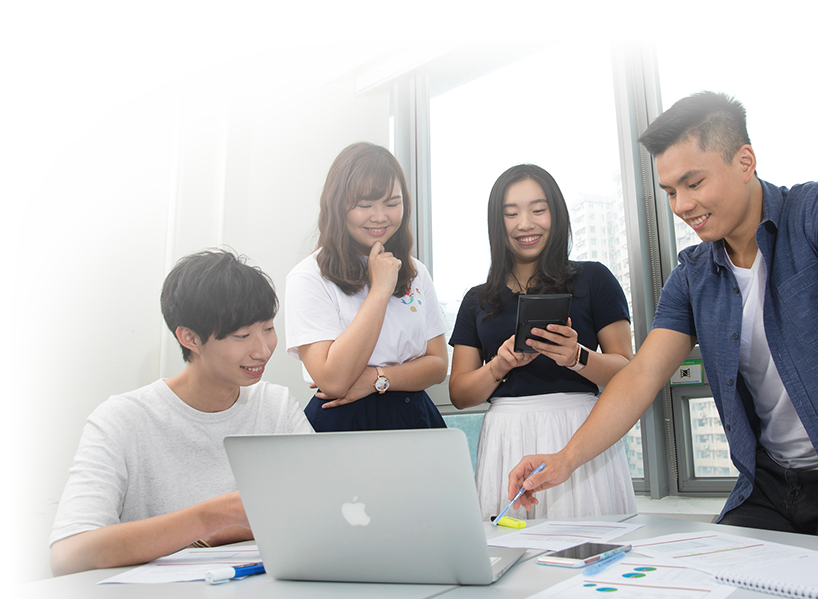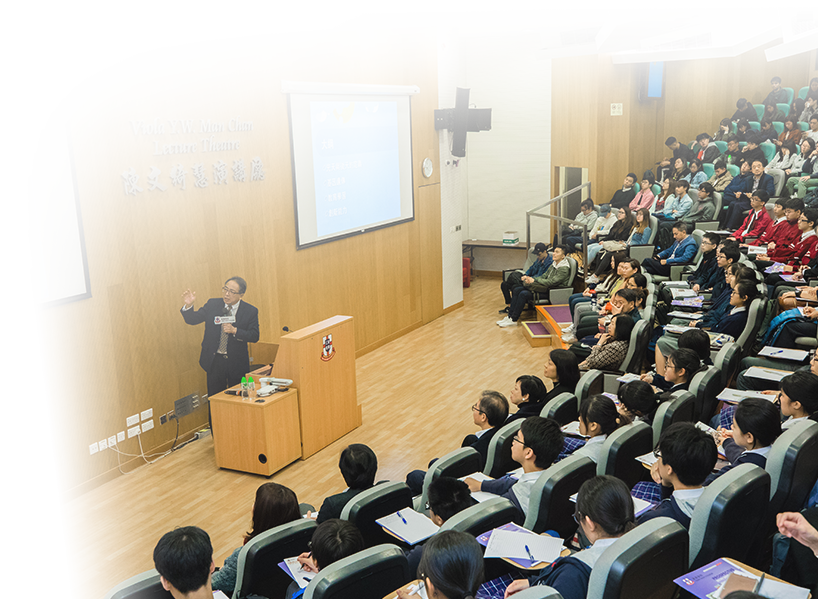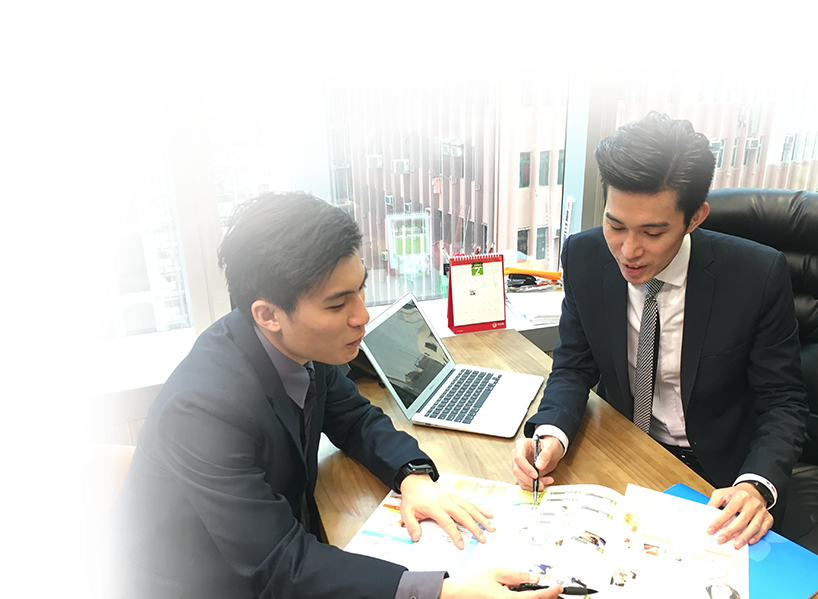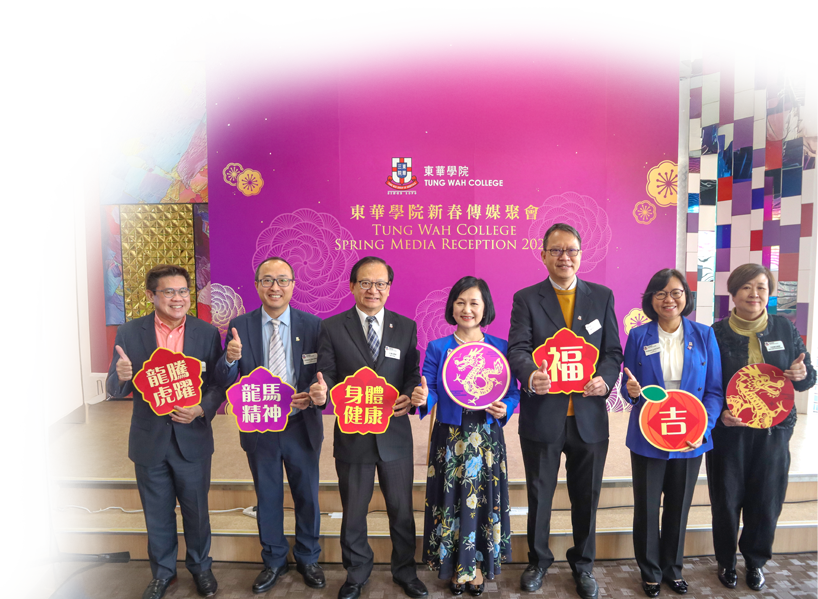The research team from Tung Wah College (TWC)’s Translational Research Centre for Digital Mental Health (TRC-DMH) launched a two-year research project entitled “Inclusive Virtual Reality (VR) and Mental Well-being in Older Adults” in May 2023, inviting 265 residents of long-term care facilities (LTCFs) who are aged 60 or above with physical disabilities to experience thematic VR software of “Natural Scenes”, “Tourism”, and “Reminiscence” that were developed by the team. The project's effect on the elderly was assessed through questionnaires and interviews, and the findings revealed a significant improvement in mental health, depression symptoms, health-related quality of life, and perceived social support among the participants. In view of the promising results, the team will promote the application of the VR software with an objective to benefit the elderly residing in LTCFs or in households.
The project also trained over 50 TWC students to be digital ambassadors, who assisted the elderly in experiencing the VR software at the LTCFs, thereby enhancing their awareness of the mental well-being of the elderly and promoting intergenerational integration.
The research project received funding from the Mental Health Initiatives Funding Scheme (Phase 2) coordinated by the Advisory Committee on Mental Health.
Therapeutic VR Serves as a Community Solution
Professor Sally Chan, President of TWC who leads the research project, stated, “Senior people with physical disabilities who live in LTCFs are unable to engage in outdoor activities. Our project allows them to immerse themselves in nature, ‘participate’ in a Hong Kong and Macao tour, and even ‘stroll’ through familiar streets again while staying in LTCFs. The results of this study reflect that the VR experiences effectively enhance the mental health of the elderly. TWC hopes to transform this therapeutic VR technology into a community solution. In addition to benefiting the seniors, the project has also raised student volunteers' understanding of the elderly by providing opportunities for them to interact with seniors in LTCFs. The experience has equipped them with the skills to serve the elderly in the future.”
Professor Rick Kwan, Associate Dean (Programmes) of the School of Nursing, who is responsible for the research project, said, “By watching short videos through VR, seniors can fully immerse themselves in the videos and temporarily escape from the real world, which helps promote their mental health. We found that the therapeutic application of VR in local LTCFs is not common. All the participants had never tried VR before, and most of them expressed that they enjoyed the VR experience in this project. We believe that VR can serve as a preventive measure in primary healthcare, laying a solid foundation for the overall healthcare system.”
Significant Improvement in Health-related Quality of Life
The project recruited 265 participants, with an average age of 83.1 years, who were divided into an intervention group (133 people) and a control group (132 people). The team adopted several tools for assessment: the "World Health Organisation Five Well-Being Index (WHO-5)" to evaluate mental health status, the "Patient Health Questionnaire-9 (PHQ-9)" to assess depressive symptoms, the "EuroQol-5 Dimensions-5 Levels (EQ-5D-5L)" to evaluate health-related quality of life, the "Perceived Social Support Scale (PSSS)" to assess perceived social support, and the "De Jong Gierveld Loneliness Scale (DGLS-6)" to evaluate feelings of loneliness.
The results showed that participants in the intervention group experienced significant improvements in health-related quality of life after six weeks of a total of 12 VR experience sessions, while the control group showed no significant changes. Mental health improved in both the intervention group and the control group. Symptoms of depression decreased in both the intervention group and the control group. The intervention group also showed significant improvements in perceived social support, while the control group showed no significant changes. There were no significant changes in feelings of loneliness for either group.
In summary, therapeutic VR technology is very effective in improving the mental health of the elderly, particularly in enhancing health-related quality of life. The research team believes that this innovative intervention should be adopted by LTCFs to promote the mental health of seniors with physical disabilities.
VR Software Tailored to HK Seniors’ Preferences
Most VR software available in the market is primarily in foreign languages, making it difficult for locals to engage. Therefore, the research team specially customised video content that interests Hong Kong seniors to enhance their resonance. The video themes are divided into three categories: Natural Scenes (beaches / snowy areas / waterfalls / forests), Tourism (Ngong Ping 360 and Po Lin Monastery / Macao heritage sites / new attractions in Macao / The Peak and Stanley), and Reminiscence (Tai O fishing village / traditional wedding banquet / playgrounds during Mid-Autumn festival / tenement buildings and streetscape).
Given the positive research results, the team is planning to promote the application of the VR software. Before the official launch, the team will conduct market research to better understand the needs and preferences of the target market, and enhance the content accordingly. They will also carry out pilot programmes in LTCFs.
Practical Opportunities to Equip Students with Skills to Serve the Elderly
Committed to nurturing socially responsible and caring students, TWC recruited over 50 students to become digital ambassadors, who assisted seniors in experiencing VR at LTCFs. This effort aims to enhance their understanding of elderly issues and health, cultivate empathy, reduce criticism, and eliminate misunderstandings. In interviews conducted after the study, students expressed that the project enabled them to understand the loneliness and psychological needs faced by seniors, fostering their passion and confidence in serving the elderly in the future.





























